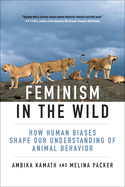
Evolutionary biologist and behavioral ecologist Ambika Kamath and race, gender, and sexualities professor Melina Packer (Toxic Sexual Politics) join forces in the astonishing Feminism in the Wild: How Human Biases Shape Our Understanding of Animal Behavior. They turn a queer, feminist, antiracist, and antiableist lens on the field of evolutionary biology and clearly demonstrate that the idea of objectivity in scientific endeavors is a myth, and that all scientific conclusions are products of political environments and ideological beliefs.
The book's focus is epistemological, asking how we know the things we know. For many people, questioning conclusions reached through the scientific method learned in primary school is almost unthinkable. But in a dynamic historical narrative, Kamath and Packer interrogate the formation of that foundational concept and lay out the political forces that built evolutionary biology as a eugenics-focused field from the beginning. The specific details of evolutionary biology are secondary to this central point, but they are fascinating, such as a discussion of scientists' attempts to explain the spotted hyena's unwieldy and impractical eight-inch-long clitoris, through which they give birth.
With clarity and obvious passion, the authors cover an impressive number of specialized topics, including optimality thinking, "survival of the fit enough," and co-constitution, which is the inseparability of multiple factors that shape scientific knowledge and evolution itself. References to other chapters throughout the book make it easy to flip back to related topics, and discussions of how other scientists changed their views after encountering paradigm-threatening anomalies allow readers to imagine their own understanding developing as well. --Dainy Bernstein, freelance reviewer

